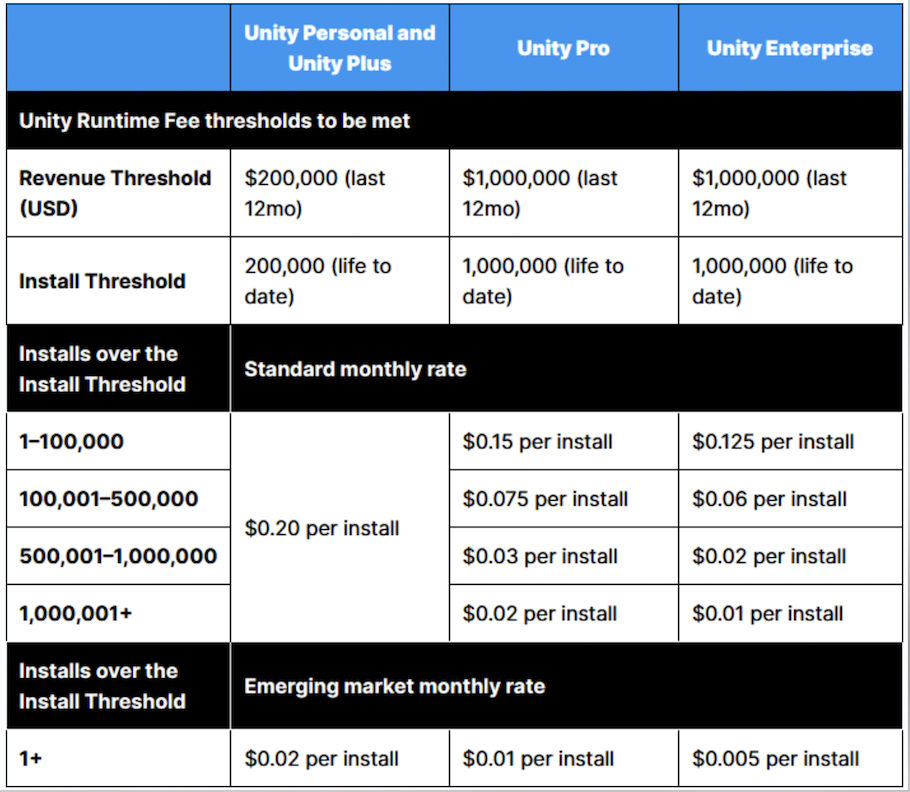On September 12, Unity made a controversial announcement, introducing a ‘runtime fee’ that could potentially create financial hurdles for many studios. Our CTO Andrei Apanasik is here to shed light on what this entails for developers and how Balancy will support developers during these challenging times.
| Meet Andrei Apanasik, our CTO and Co-founder at Balancy. With over a decade of game development experience (in MOBA, social casino, and other genres), he founded Balancy to let developers focus on the fun stuff, not tools. He’s also a blogger, the #1 author on DTF and among top content creators on Habr and Gamedev Suffering 🎮✍️ |
What’s happened?
Unity has changed the engine licensing system. In a nutshell, they will now consider not only revenue but also installations when determining the payment threshold, and they will charge for each installation.
This is how the new pricing model (to be activated on January 1st, 2024) looks like:

They have completely removed the Plus plan for new users.
Starting from January 1, 2024, there will be a requirement to periodically log in on the Personal plan:
“Starting in November, Unity Personal users will get a new sign-in and online user experience. Users will need to be signed into the Hub with their Unity ID and connect to the internet to use Unity. If the internet connection is lost, users can continue using Unity for up to 3 days while offline. More details to come, when this change takes effect.”
It turns out that if you don’t log in to the system within 3 days, you won’t be able to use it even in offline mode.
Community reaction

Many indie developers have already announced that they will not be using Unity for their upcoming games.

Industry leaders react as well:

Some developers are now boycotting Unity by switching off its ad products, according to Mobilegamer.biz.
Backdating changes in TOS
Unity quietly removed its license change tracking repository and updated its terms of service retroactively. They removed the clause that allowed you to use the TOS from your version of Unity. People have started forking it just in case.
Various companies have calculated how this will personally affect them. For instance, Nekki’s founder Dmitri Terekhin wrote that Unity’s new policy could increase their expenses by up to 50 times in the worst-case scenario.
Backtracking, but just a bit…
One of the Unity’s official posts offered some explanations. Again, there’s some ambiguity about the claim that “the change won’t affect more than 90% of customers”.
However, they did make slight improvements:
- They won’t charge for reinstalls.
- They won’t charge for fraudulent installations, although it’s unclear how they’ll track them.
- There’s no need to pay for demos, trials, and devops.
- You will have to pay for games in early access.
- There’s no need to pay for web and streaming games 🤔
- No charges for charitable bundles.
The pain of calculations
When using Unreal Engine, for example, there’s a fixed revenue share rate of 5%. It’s stable, easy to plan for, and can be factored in at any stage of the project.
On the other hand, Unity’s model is highly fluctuating, hard to predict, and it adds a plethora of problems for developers.
Unfair competition
Unity is offering companies fee exemptions. You can obtain it by refraining from using AppLovin and other third-party monetization services.
For now, it’s only at the level of media discussions, but still worth noting.
Undermined trust
Even if Unity roll back all the changes, the company has already eroded trust and demonstrated that it can alter terms and rules retrospectively in the future. That’s precisely why many are planning a switch to other game engines.
However, even within the company, things aren’t running smoothly. A Unity employee writes that they “fought like hell against this, brought up all the points everyone has, were told answers were coming, and then the announcement went out without warning”. At the end of the week, resignations are expected from those who disagreed with the decision.
A thread from a Unity employee who participated in the initial discussions about pricing changes a year ago. He says that changes in pricing were unavoidable, but Unity’s implementation and comments were not that great.
TL;DR:
- 3,000 engineers work exclusively on the engine.
- Engine development is highly unprofitable.
- Unity Ads sustains the entire company.
- Payment for seats doesn’t scale well.
- Apple’s policy changes have hit the advertising business hard.
What are Balancy’s plans?
CPI costs are already high, and the new runtime fee is going to make a profitability game even more challenging for developers. The growth discourse will inevitably shift from user acquisition at all costs to better monetisation of newly attracted and current players. LiveOps tactics are the best solution to maximising your game’s LTV, and we at Balancy understand the important role our platform will play in the ongoing changes.
At the moment, all our clients are using Unity plugin to integrate with the platform. At times like this, it’s important that the community helps each other to stay afloat. There are two directions in which we are working right now:
- Our team is actively including SDKs for other engines (Unreal, Cocos, Godot, and native) in the roadmap.
- We are also planning to announce unique, no-cost plans for select developer groups to give them a chance to better monetize their games and survive.
Feel free to contact us and share your needs in LiveOps tools, SDKs, and special pricing conditions. Write to julia@balancy.co and we will answer everyone.
